Analysis of Corruption as an Unavoidable Aspect of Police Work
VerifiedAdded on 2022/09/28
|10
|2757
|31
Essay
AI Summary
This essay critically examines the contentious issue of police corruption, specifically addressing the question of whether it is an unavoidable aspect of police work. It begins by defining police corruption and its detrimental effects on public trust, the economy, and justice systems. The essay traces the historical evolution of policing, highlighting the impact of management styles and organizational cultures on ethical conduct. It explores various types of corruption, including those driven by personal gain, organizational goals, and situational factors. The analysis delves into causative agents like power dynamics, psychological influences, and opportunities for misconduct. The essay acknowledges the complexity of real-life scenarios where corruption might seem necessary, while still condemning such practices. It proposes potential solutions such as strong leadership, internal reporting policies, technological advancements like body cameras, and comprehensive training programs to curb corruption and promote ethical behavior within law enforcement agencies. The essay concludes by emphasizing the severe consequences of corruption, including damage to public perception, increased crime rates, and erosion of fundamental human rights.
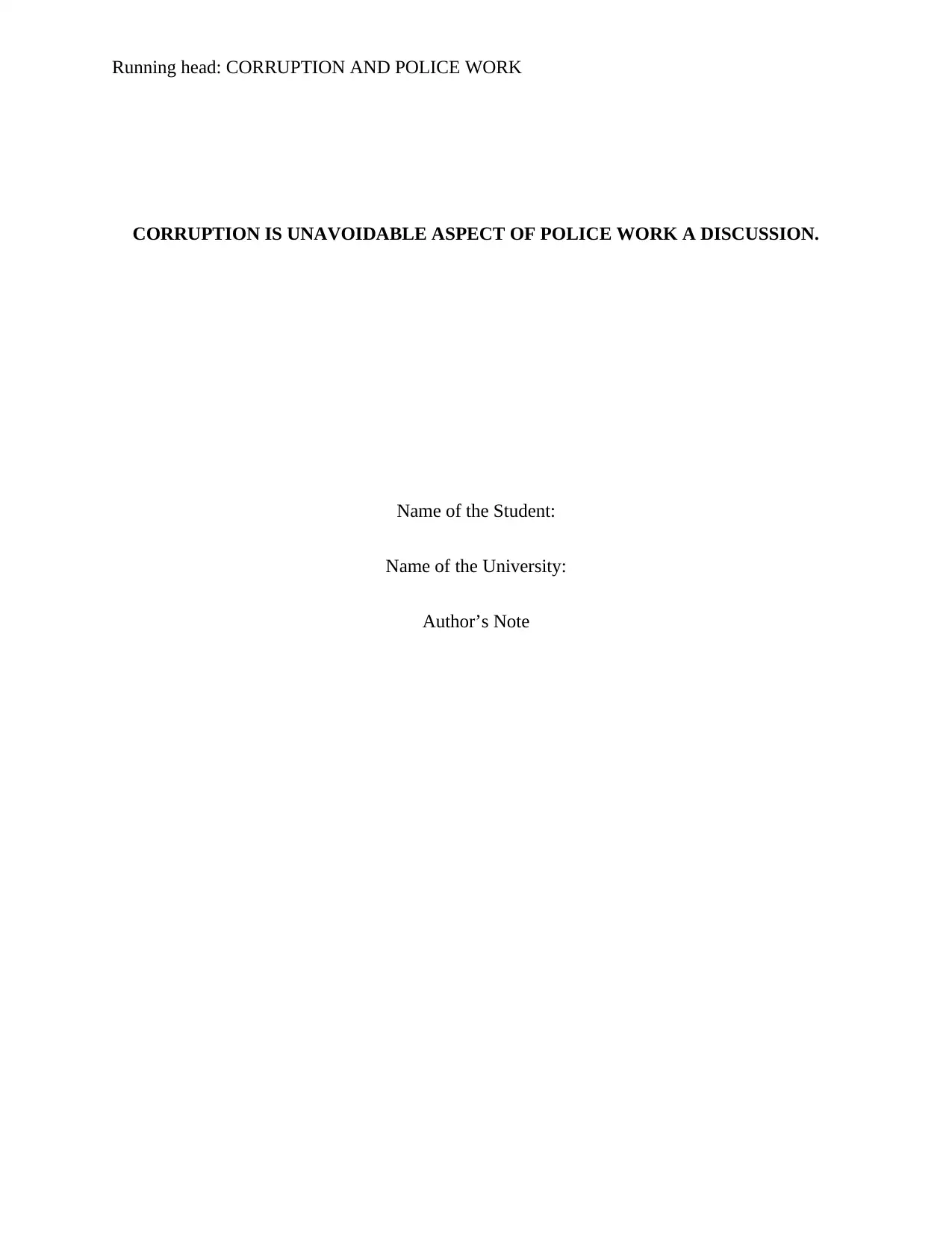
Running head: CORRUPTION AND POLICE WORK
CORRUPTION IS UNAVOIDABLE ASPECT OF POLICE WORK A DISCUSSION.
Name of the Student:
Name of the University:
Author’s Note
CORRUPTION IS UNAVOIDABLE ASPECT OF POLICE WORK A DISCUSSION.
Name of the Student:
Name of the University:
Author’s Note
Paraphrase This Document
Need a fresh take? Get an instant paraphrase of this document with our AI Paraphraser
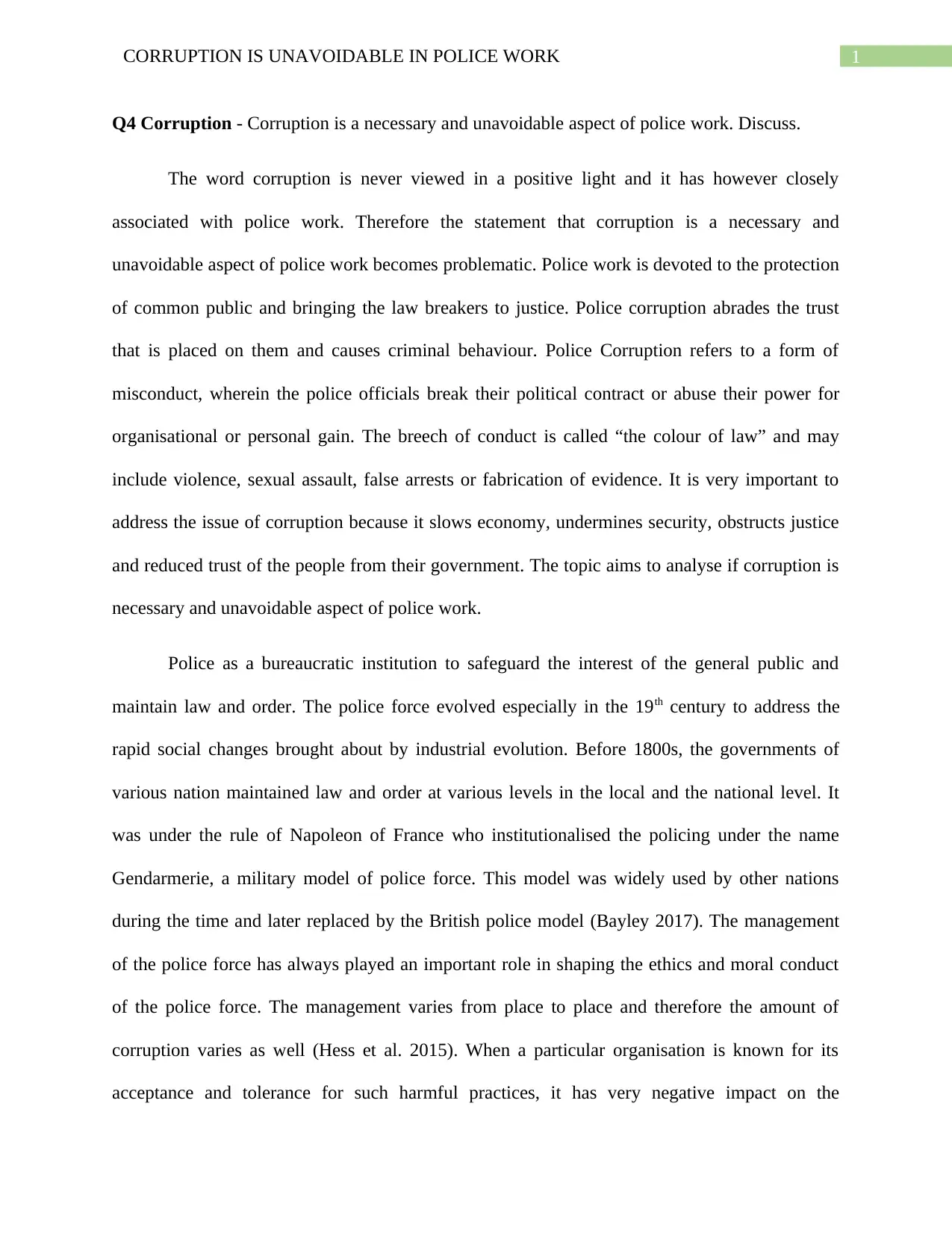
1CORRUPTION IS UNAVOIDABLE IN POLICE WORK
Q4 Corruption - Corruption is a necessary and unavoidable aspect of police work. Discuss.
The word corruption is never viewed in a positive light and it has however closely
associated with police work. Therefore the statement that corruption is a necessary and
unavoidable aspect of police work becomes problematic. Police work is devoted to the protection
of common public and bringing the law breakers to justice. Police corruption abrades the trust
that is placed on them and causes criminal behaviour. Police Corruption refers to a form of
misconduct, wherein the police officials break their political contract or abuse their power for
organisational or personal gain. The breech of conduct is called “the colour of law” and may
include violence, sexual assault, false arrests or fabrication of evidence. It is very important to
address the issue of corruption because it slows economy, undermines security, obstructs justice
and reduced trust of the people from their government. The topic aims to analyse if corruption is
necessary and unavoidable aspect of police work.
Police as a bureaucratic institution to safeguard the interest of the general public and
maintain law and order. The police force evolved especially in the 19th century to address the
rapid social changes brought about by industrial evolution. Before 1800s, the governments of
various nation maintained law and order at various levels in the local and the national level. It
was under the rule of Napoleon of France who institutionalised the policing under the name
Gendarmerie, a military model of police force. This model was widely used by other nations
during the time and later replaced by the British police model (Bayley 2017). The management
of the police force has always played an important role in shaping the ethics and moral conduct
of the police force. The management varies from place to place and therefore the amount of
corruption varies as well (Hess et al. 2015). When a particular organisation is known for its
acceptance and tolerance for such harmful practices, it has very negative impact on the
Q4 Corruption - Corruption is a necessary and unavoidable aspect of police work. Discuss.
The word corruption is never viewed in a positive light and it has however closely
associated with police work. Therefore the statement that corruption is a necessary and
unavoidable aspect of police work becomes problematic. Police work is devoted to the protection
of common public and bringing the law breakers to justice. Police corruption abrades the trust
that is placed on them and causes criminal behaviour. Police Corruption refers to a form of
misconduct, wherein the police officials break their political contract or abuse their power for
organisational or personal gain. The breech of conduct is called “the colour of law” and may
include violence, sexual assault, false arrests or fabrication of evidence. It is very important to
address the issue of corruption because it slows economy, undermines security, obstructs justice
and reduced trust of the people from their government. The topic aims to analyse if corruption is
necessary and unavoidable aspect of police work.
Police as a bureaucratic institution to safeguard the interest of the general public and
maintain law and order. The police force evolved especially in the 19th century to address the
rapid social changes brought about by industrial evolution. Before 1800s, the governments of
various nation maintained law and order at various levels in the local and the national level. It
was under the rule of Napoleon of France who institutionalised the policing under the name
Gendarmerie, a military model of police force. This model was widely used by other nations
during the time and later replaced by the British police model (Bayley 2017). The management
of the police force has always played an important role in shaping the ethics and moral conduct
of the police force. The management varies from place to place and therefore the amount of
corruption varies as well (Hess et al. 2015). When a particular organisation is known for its
acceptance and tolerance for such harmful practices, it has very negative impact on the
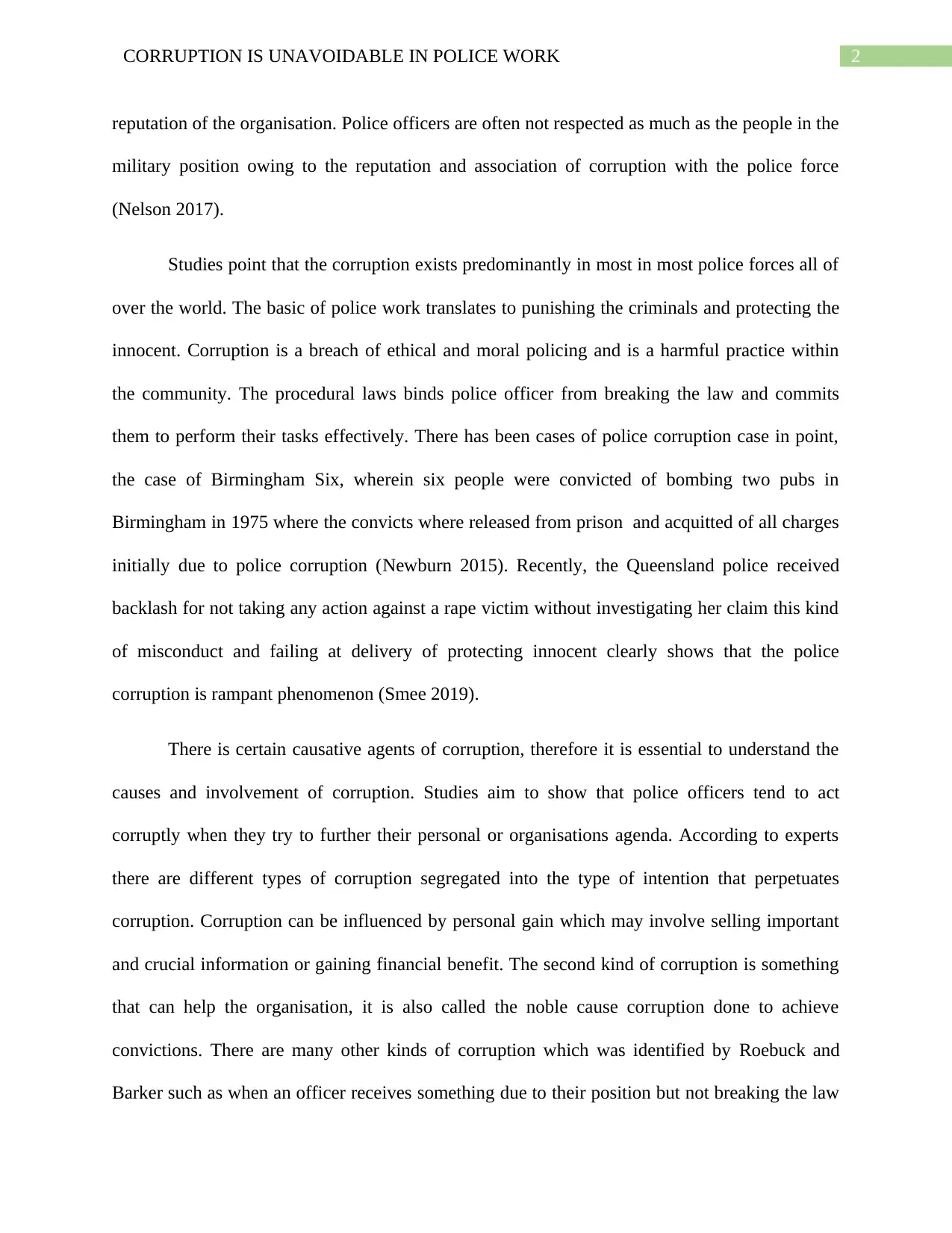
2CORRUPTION IS UNAVOIDABLE IN POLICE WORK
reputation of the organisation. Police officers are often not respected as much as the people in the
military position owing to the reputation and association of corruption with the police force
(Nelson 2017).
Studies point that the corruption exists predominantly in most in most police forces all of
over the world. The basic of police work translates to punishing the criminals and protecting the
innocent. Corruption is a breach of ethical and moral policing and is a harmful practice within
the community. The procedural laws binds police officer from breaking the law and commits
them to perform their tasks effectively. There has been cases of police corruption case in point,
the case of Birmingham Six, wherein six people were convicted of bombing two pubs in
Birmingham in 1975 where the convicts where released from prison and acquitted of all charges
initially due to police corruption (Newburn 2015). Recently, the Queensland police received
backlash for not taking any action against a rape victim without investigating her claim this kind
of misconduct and failing at delivery of protecting innocent clearly shows that the police
corruption is rampant phenomenon (Smee 2019).
There is certain causative agents of corruption, therefore it is essential to understand the
causes and involvement of corruption. Studies aim to show that police officers tend to act
corruptly when they try to further their personal or organisations agenda. According to experts
there are different types of corruption segregated into the type of intention that perpetuates
corruption. Corruption can be influenced by personal gain which may involve selling important
and crucial information or gaining financial benefit. The second kind of corruption is something
that can help the organisation, it is also called the noble cause corruption done to achieve
convictions. There are many other kinds of corruption which was identified by Roebuck and
Barker such as when an officer receives something due to their position but not breaking the law
reputation of the organisation. Police officers are often not respected as much as the people in the
military position owing to the reputation and association of corruption with the police force
(Nelson 2017).
Studies point that the corruption exists predominantly in most in most police forces all of
over the world. The basic of police work translates to punishing the criminals and protecting the
innocent. Corruption is a breach of ethical and moral policing and is a harmful practice within
the community. The procedural laws binds police officer from breaking the law and commits
them to perform their tasks effectively. There has been cases of police corruption case in point,
the case of Birmingham Six, wherein six people were convicted of bombing two pubs in
Birmingham in 1975 where the convicts where released from prison and acquitted of all charges
initially due to police corruption (Newburn 2015). Recently, the Queensland police received
backlash for not taking any action against a rape victim without investigating her claim this kind
of misconduct and failing at delivery of protecting innocent clearly shows that the police
corruption is rampant phenomenon (Smee 2019).
There is certain causative agents of corruption, therefore it is essential to understand the
causes and involvement of corruption. Studies aim to show that police officers tend to act
corruptly when they try to further their personal or organisations agenda. According to experts
there are different types of corruption segregated into the type of intention that perpetuates
corruption. Corruption can be influenced by personal gain which may involve selling important
and crucial information or gaining financial benefit. The second kind of corruption is something
that can help the organisation, it is also called the noble cause corruption done to achieve
convictions. There are many other kinds of corruption which was identified by Roebuck and
Barker such as when an officer receives something due to their position but not breaking the law
⊘ This is a preview!⊘
Do you want full access?
Subscribe today to unlock all pages.

Trusted by 1+ million students worldwide
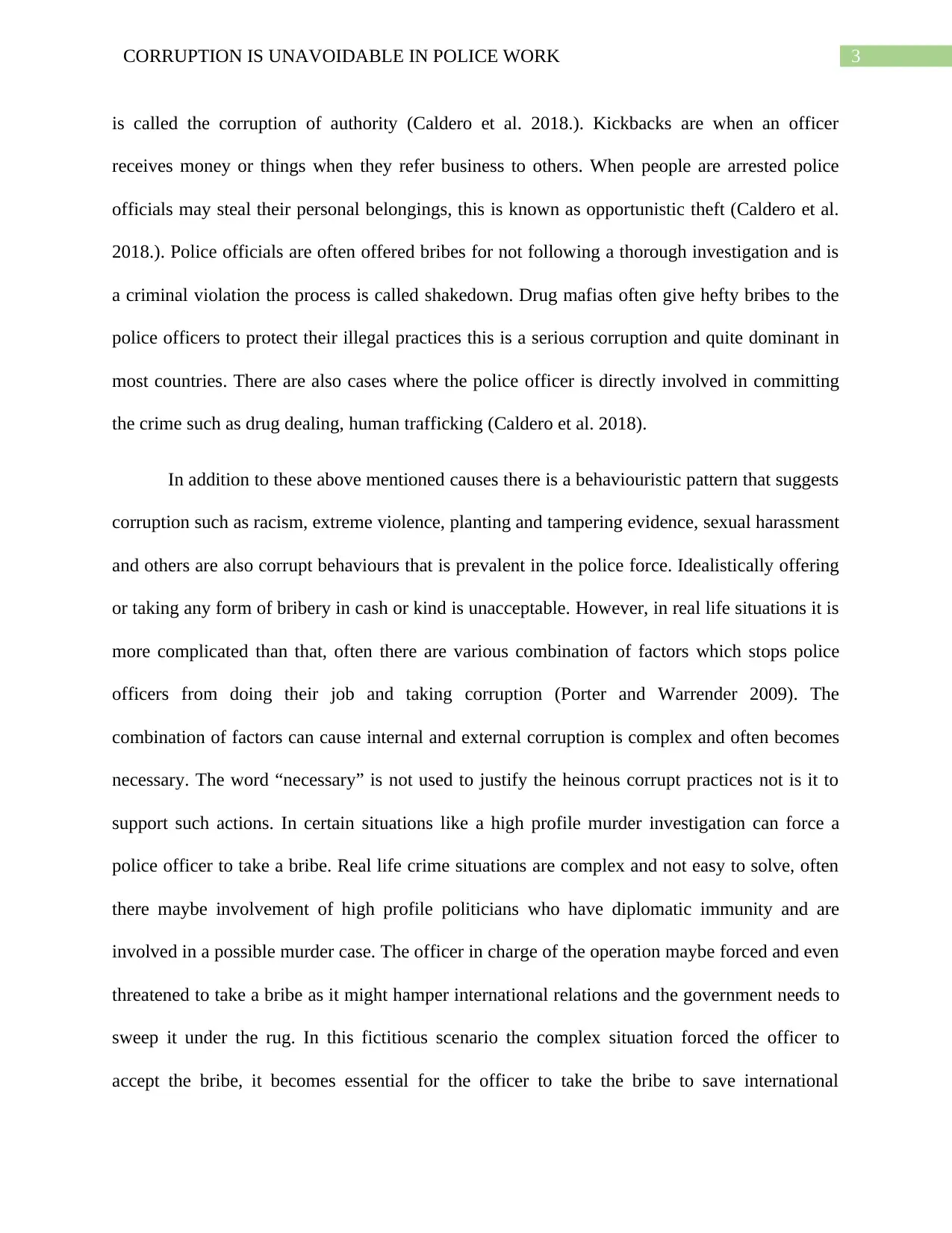
3CORRUPTION IS UNAVOIDABLE IN POLICE WORK
is called the corruption of authority (Caldero et al. 2018.). Kickbacks are when an officer
receives money or things when they refer business to others. When people are arrested police
officials may steal their personal belongings, this is known as opportunistic theft (Caldero et al.
2018.). Police officials are often offered bribes for not following a thorough investigation and is
a criminal violation the process is called shakedown. Drug mafias often give hefty bribes to the
police officers to protect their illegal practices this is a serious corruption and quite dominant in
most countries. There are also cases where the police officer is directly involved in committing
the crime such as drug dealing, human trafficking (Caldero et al. 2018).
In addition to these above mentioned causes there is a behaviouristic pattern that suggests
corruption such as racism, extreme violence, planting and tampering evidence, sexual harassment
and others are also corrupt behaviours that is prevalent in the police force. Idealistically offering
or taking any form of bribery in cash or kind is unacceptable. However, in real life situations it is
more complicated than that, often there are various combination of factors which stops police
officers from doing their job and taking corruption (Porter and Warrender 2009). The
combination of factors can cause internal and external corruption is complex and often becomes
necessary. The word “necessary” is not used to justify the heinous corrupt practices not is it to
support such actions. In certain situations like a high profile murder investigation can force a
police officer to take a bribe. Real life crime situations are complex and not easy to solve, often
there maybe involvement of high profile politicians who have diplomatic immunity and are
involved in a possible murder case. The officer in charge of the operation maybe forced and even
threatened to take a bribe as it might hamper international relations and the government needs to
sweep it under the rug. In this fictitious scenario the complex situation forced the officer to
accept the bribe, it becomes essential for the officer to take the bribe to save international
is called the corruption of authority (Caldero et al. 2018.). Kickbacks are when an officer
receives money or things when they refer business to others. When people are arrested police
officials may steal their personal belongings, this is known as opportunistic theft (Caldero et al.
2018.). Police officials are often offered bribes for not following a thorough investigation and is
a criminal violation the process is called shakedown. Drug mafias often give hefty bribes to the
police officers to protect their illegal practices this is a serious corruption and quite dominant in
most countries. There are also cases where the police officer is directly involved in committing
the crime such as drug dealing, human trafficking (Caldero et al. 2018).
In addition to these above mentioned causes there is a behaviouristic pattern that suggests
corruption such as racism, extreme violence, planting and tampering evidence, sexual harassment
and others are also corrupt behaviours that is prevalent in the police force. Idealistically offering
or taking any form of bribery in cash or kind is unacceptable. However, in real life situations it is
more complicated than that, often there are various combination of factors which stops police
officers from doing their job and taking corruption (Porter and Warrender 2009). The
combination of factors can cause internal and external corruption is complex and often becomes
necessary. The word “necessary” is not used to justify the heinous corrupt practices not is it to
support such actions. In certain situations like a high profile murder investigation can force a
police officer to take a bribe. Real life crime situations are complex and not easy to solve, often
there maybe involvement of high profile politicians who have diplomatic immunity and are
involved in a possible murder case. The officer in charge of the operation maybe forced and even
threatened to take a bribe as it might hamper international relations and the government needs to
sweep it under the rug. In this fictitious scenario the complex situation forced the officer to
accept the bribe, it becomes essential for the officer to take the bribe to save international
Paraphrase This Document
Need a fresh take? Get an instant paraphrase of this document with our AI Paraphraser
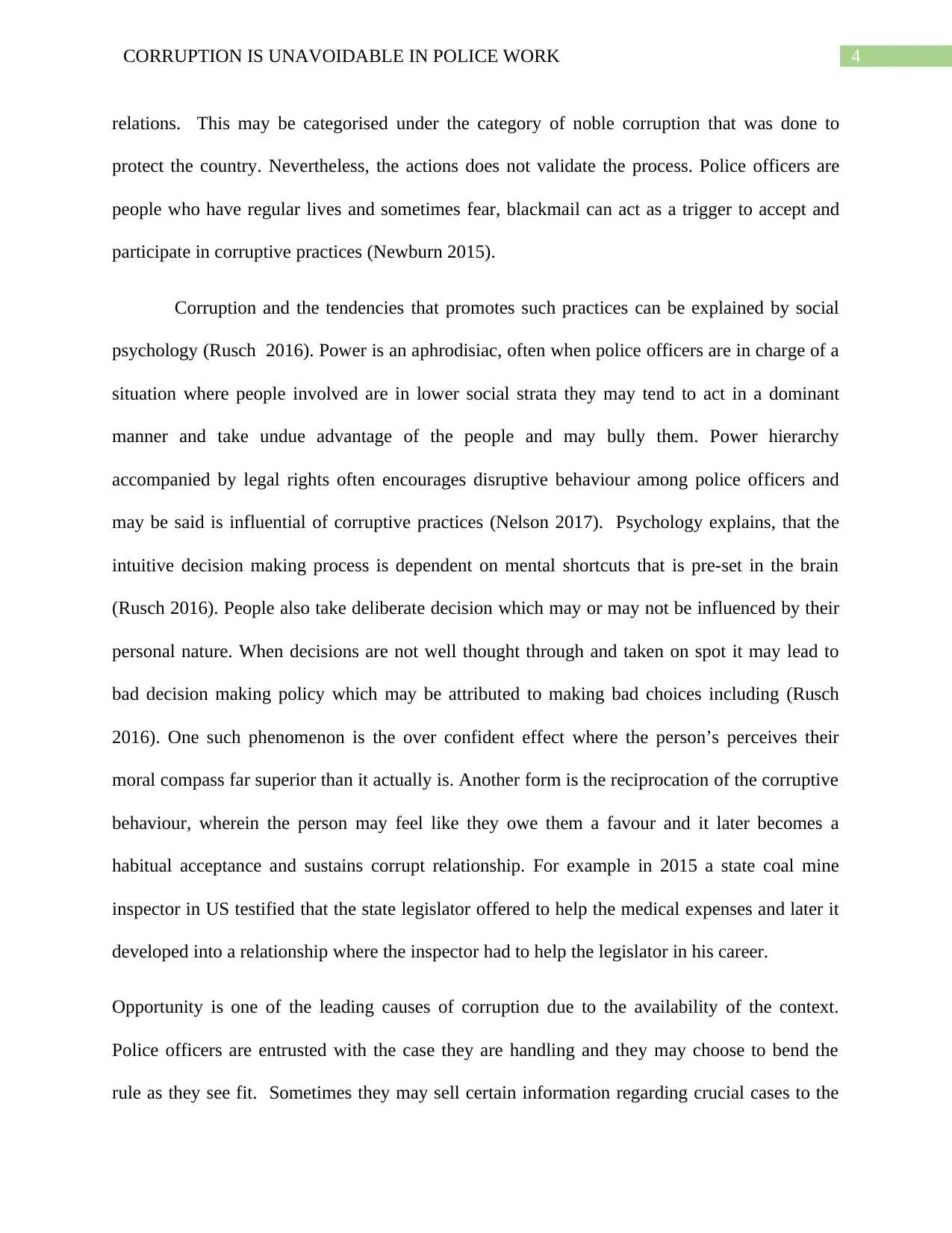
4CORRUPTION IS UNAVOIDABLE IN POLICE WORK
relations. This may be categorised under the category of noble corruption that was done to
protect the country. Nevertheless, the actions does not validate the process. Police officers are
people who have regular lives and sometimes fear, blackmail can act as a trigger to accept and
participate in corruptive practices (Newburn 2015).
Corruption and the tendencies that promotes such practices can be explained by social
psychology (Rusch 2016). Power is an aphrodisiac, often when police officers are in charge of a
situation where people involved are in lower social strata they may tend to act in a dominant
manner and take undue advantage of the people and may bully them. Power hierarchy
accompanied by legal rights often encourages disruptive behaviour among police officers and
may be said is influential of corruptive practices (Nelson 2017). Psychology explains, that the
intuitive decision making process is dependent on mental shortcuts that is pre-set in the brain
(Rusch 2016). People also take deliberate decision which may or may not be influenced by their
personal nature. When decisions are not well thought through and taken on spot it may lead to
bad decision making policy which may be attributed to making bad choices including (Rusch
2016). One such phenomenon is the over confident effect where the person’s perceives their
moral compass far superior than it actually is. Another form is the reciprocation of the corruptive
behaviour, wherein the person may feel like they owe them a favour and it later becomes a
habitual acceptance and sustains corrupt relationship. For example in 2015 a state coal mine
inspector in US testified that the state legislator offered to help the medical expenses and later it
developed into a relationship where the inspector had to help the legislator in his career.
Opportunity is one of the leading causes of corruption due to the availability of the context.
Police officers are entrusted with the case they are handling and they may choose to bend the
rule as they see fit. Sometimes they may sell certain information regarding crucial cases to the
relations. This may be categorised under the category of noble corruption that was done to
protect the country. Nevertheless, the actions does not validate the process. Police officers are
people who have regular lives and sometimes fear, blackmail can act as a trigger to accept and
participate in corruptive practices (Newburn 2015).
Corruption and the tendencies that promotes such practices can be explained by social
psychology (Rusch 2016). Power is an aphrodisiac, often when police officers are in charge of a
situation where people involved are in lower social strata they may tend to act in a dominant
manner and take undue advantage of the people and may bully them. Power hierarchy
accompanied by legal rights often encourages disruptive behaviour among police officers and
may be said is influential of corruptive practices (Nelson 2017). Psychology explains, that the
intuitive decision making process is dependent on mental shortcuts that is pre-set in the brain
(Rusch 2016). People also take deliberate decision which may or may not be influenced by their
personal nature. When decisions are not well thought through and taken on spot it may lead to
bad decision making policy which may be attributed to making bad choices including (Rusch
2016). One such phenomenon is the over confident effect where the person’s perceives their
moral compass far superior than it actually is. Another form is the reciprocation of the corruptive
behaviour, wherein the person may feel like they owe them a favour and it later becomes a
habitual acceptance and sustains corrupt relationship. For example in 2015 a state coal mine
inspector in US testified that the state legislator offered to help the medical expenses and later it
developed into a relationship where the inspector had to help the legislator in his career.
Opportunity is one of the leading causes of corruption due to the availability of the context.
Police officers are entrusted with the case they are handling and they may choose to bend the
rule as they see fit. Sometimes they may sell certain information regarding crucial cases to the
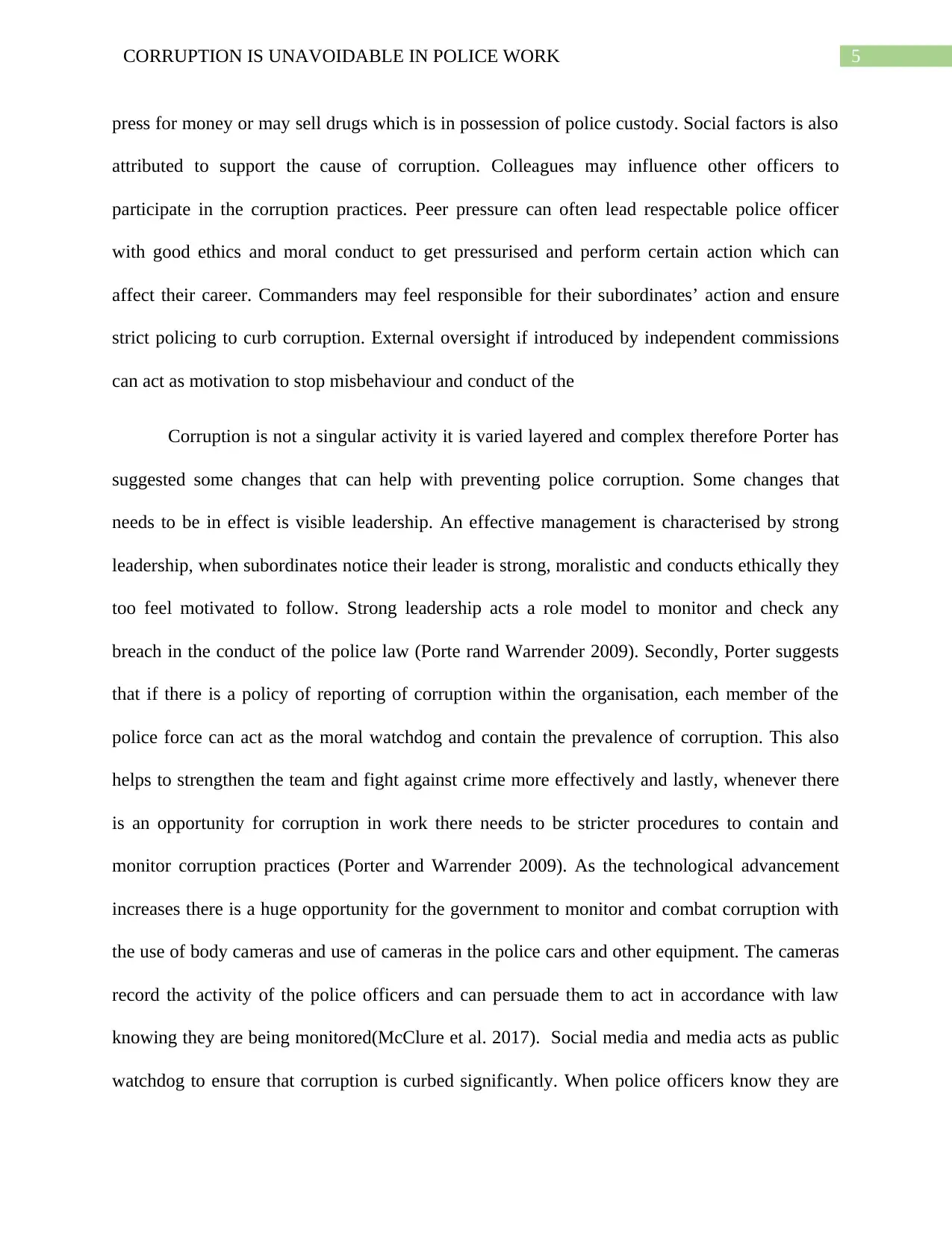
5CORRUPTION IS UNAVOIDABLE IN POLICE WORK
press for money or may sell drugs which is in possession of police custody. Social factors is also
attributed to support the cause of corruption. Colleagues may influence other officers to
participate in the corruption practices. Peer pressure can often lead respectable police officer
with good ethics and moral conduct to get pressurised and perform certain action which can
affect their career. Commanders may feel responsible for their subordinates’ action and ensure
strict policing to curb corruption. External oversight if introduced by independent commissions
can act as motivation to stop misbehaviour and conduct of the
Corruption is not a singular activity it is varied layered and complex therefore Porter has
suggested some changes that can help with preventing police corruption. Some changes that
needs to be in effect is visible leadership. An effective management is characterised by strong
leadership, when subordinates notice their leader is strong, moralistic and conducts ethically they
too feel motivated to follow. Strong leadership acts a role model to monitor and check any
breach in the conduct of the police law (Porte rand Warrender 2009). Secondly, Porter suggests
that if there is a policy of reporting of corruption within the organisation, each member of the
police force can act as the moral watchdog and contain the prevalence of corruption. This also
helps to strengthen the team and fight against crime more effectively and lastly, whenever there
is an opportunity for corruption in work there needs to be stricter procedures to contain and
monitor corruption practices (Porter and Warrender 2009). As the technological advancement
increases there is a huge opportunity for the government to monitor and combat corruption with
the use of body cameras and use of cameras in the police cars and other equipment. The cameras
record the activity of the police officers and can persuade them to act in accordance with law
knowing they are being monitored(McClure et al. 2017). Social media and media acts as public
watchdog to ensure that corruption is curbed significantly. When police officers know they are
press for money or may sell drugs which is in possession of police custody. Social factors is also
attributed to support the cause of corruption. Colleagues may influence other officers to
participate in the corruption practices. Peer pressure can often lead respectable police officer
with good ethics and moral conduct to get pressurised and perform certain action which can
affect their career. Commanders may feel responsible for their subordinates’ action and ensure
strict policing to curb corruption. External oversight if introduced by independent commissions
can act as motivation to stop misbehaviour and conduct of the
Corruption is not a singular activity it is varied layered and complex therefore Porter has
suggested some changes that can help with preventing police corruption. Some changes that
needs to be in effect is visible leadership. An effective management is characterised by strong
leadership, when subordinates notice their leader is strong, moralistic and conducts ethically they
too feel motivated to follow. Strong leadership acts a role model to monitor and check any
breach in the conduct of the police law (Porte rand Warrender 2009). Secondly, Porter suggests
that if there is a policy of reporting of corruption within the organisation, each member of the
police force can act as the moral watchdog and contain the prevalence of corruption. This also
helps to strengthen the team and fight against crime more effectively and lastly, whenever there
is an opportunity for corruption in work there needs to be stricter procedures to contain and
monitor corruption practices (Porter and Warrender 2009). As the technological advancement
increases there is a huge opportunity for the government to monitor and combat corruption with
the use of body cameras and use of cameras in the police cars and other equipment. The cameras
record the activity of the police officers and can persuade them to act in accordance with law
knowing they are being monitored(McClure et al. 2017). Social media and media acts as public
watchdog to ensure that corruption is curbed significantly. When police officers know they are
⊘ This is a preview!⊘
Do you want full access?
Subscribe today to unlock all pages.

Trusted by 1+ million students worldwide
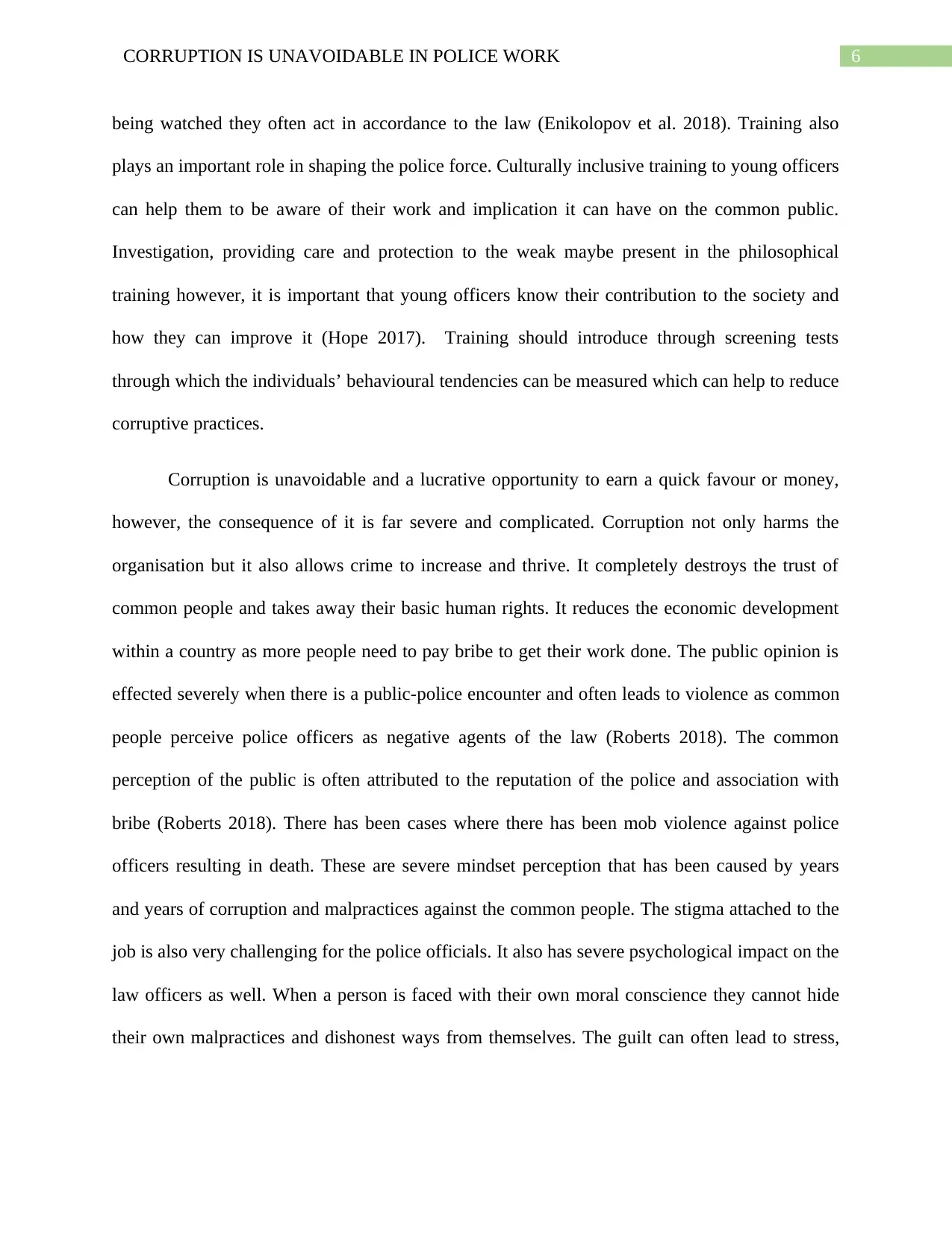
6CORRUPTION IS UNAVOIDABLE IN POLICE WORK
being watched they often act in accordance to the law (Enikolopov et al. 2018). Training also
plays an important role in shaping the police force. Culturally inclusive training to young officers
can help them to be aware of their work and implication it can have on the common public.
Investigation, providing care and protection to the weak maybe present in the philosophical
training however, it is important that young officers know their contribution to the society and
how they can improve it (Hope 2017). Training should introduce through screening tests
through which the individuals’ behavioural tendencies can be measured which can help to reduce
corruptive practices.
Corruption is unavoidable and a lucrative opportunity to earn a quick favour or money,
however, the consequence of it is far severe and complicated. Corruption not only harms the
organisation but it also allows crime to increase and thrive. It completely destroys the trust of
common people and takes away their basic human rights. It reduces the economic development
within a country as more people need to pay bribe to get their work done. The public opinion is
effected severely when there is a public-police encounter and often leads to violence as common
people perceive police officers as negative agents of the law (Roberts 2018). The common
perception of the public is often attributed to the reputation of the police and association with
bribe (Roberts 2018). There has been cases where there has been mob violence against police
officers resulting in death. These are severe mindset perception that has been caused by years
and years of corruption and malpractices against the common people. The stigma attached to the
job is also very challenging for the police officials. It also has severe psychological impact on the
law officers as well. When a person is faced with their own moral conscience they cannot hide
their own malpractices and dishonest ways from themselves. The guilt can often lead to stress,
being watched they often act in accordance to the law (Enikolopov et al. 2018). Training also
plays an important role in shaping the police force. Culturally inclusive training to young officers
can help them to be aware of their work and implication it can have on the common public.
Investigation, providing care and protection to the weak maybe present in the philosophical
training however, it is important that young officers know their contribution to the society and
how they can improve it (Hope 2017). Training should introduce through screening tests
through which the individuals’ behavioural tendencies can be measured which can help to reduce
corruptive practices.
Corruption is unavoidable and a lucrative opportunity to earn a quick favour or money,
however, the consequence of it is far severe and complicated. Corruption not only harms the
organisation but it also allows crime to increase and thrive. It completely destroys the trust of
common people and takes away their basic human rights. It reduces the economic development
within a country as more people need to pay bribe to get their work done. The public opinion is
effected severely when there is a public-police encounter and often leads to violence as common
people perceive police officers as negative agents of the law (Roberts 2018). The common
perception of the public is often attributed to the reputation of the police and association with
bribe (Roberts 2018). There has been cases where there has been mob violence against police
officers resulting in death. These are severe mindset perception that has been caused by years
and years of corruption and malpractices against the common people. The stigma attached to the
job is also very challenging for the police officials. It also has severe psychological impact on the
law officers as well. When a person is faced with their own moral conscience they cannot hide
their own malpractices and dishonest ways from themselves. The guilt can often lead to stress,
Paraphrase This Document
Need a fresh take? Get an instant paraphrase of this document with our AI Paraphraser
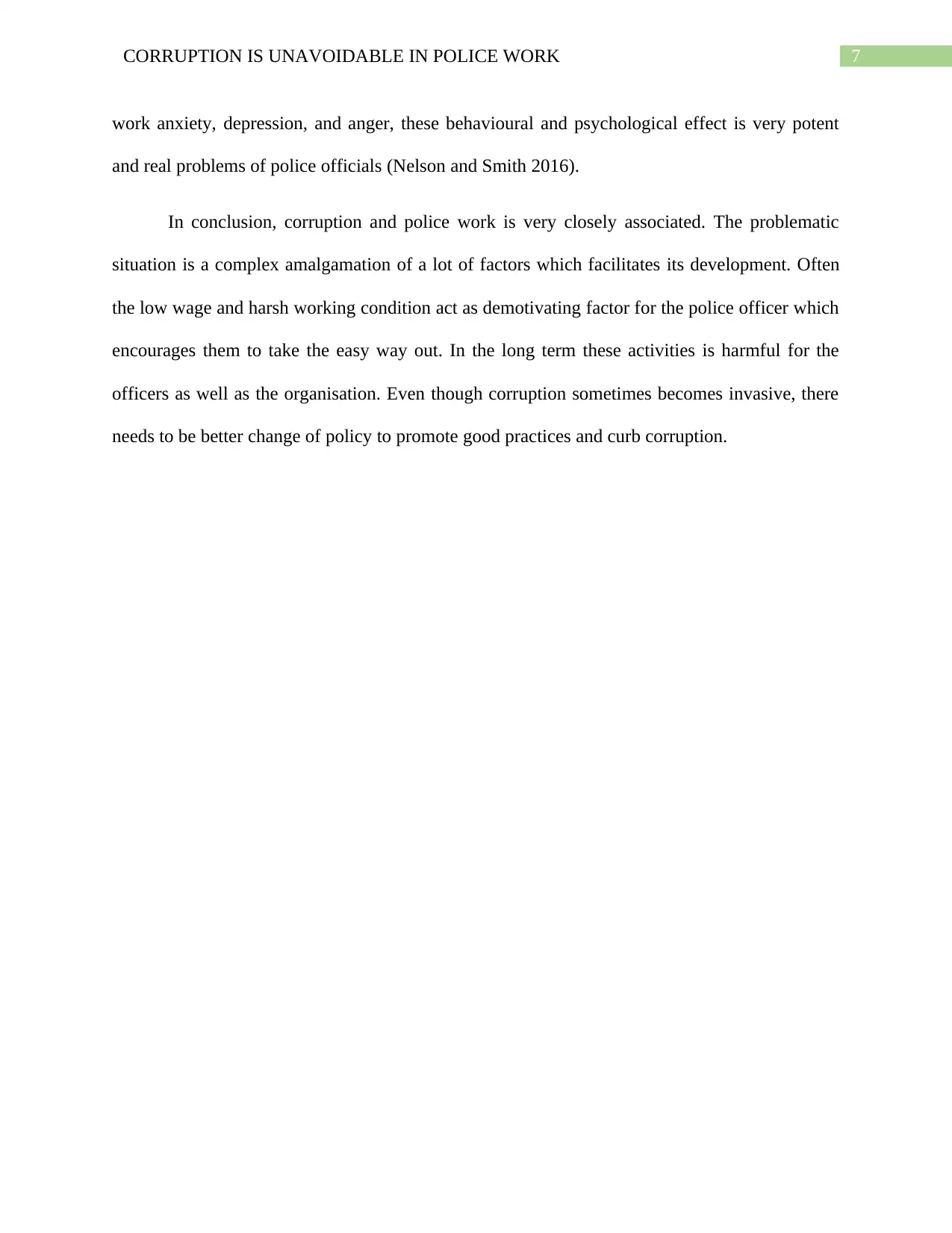
7CORRUPTION IS UNAVOIDABLE IN POLICE WORK
work anxiety, depression, and anger, these behavioural and psychological effect is very potent
and real problems of police officials (Nelson and Smith 2016).
In conclusion, corruption and police work is very closely associated. The problematic
situation is a complex amalgamation of a lot of factors which facilitates its development. Often
the low wage and harsh working condition act as demotivating factor for the police officer which
encourages them to take the easy way out. In the long term these activities is harmful for the
officers as well as the organisation. Even though corruption sometimes becomes invasive, there
needs to be better change of policy to promote good practices and curb corruption.
work anxiety, depression, and anger, these behavioural and psychological effect is very potent
and real problems of police officials (Nelson and Smith 2016).
In conclusion, corruption and police work is very closely associated. The problematic
situation is a complex amalgamation of a lot of factors which facilitates its development. Often
the low wage and harsh working condition act as demotivating factor for the police officer which
encourages them to take the easy way out. In the long term these activities is harmful for the
officers as well as the organisation. Even though corruption sometimes becomes invasive, there
needs to be better change of policy to promote good practices and curb corruption.
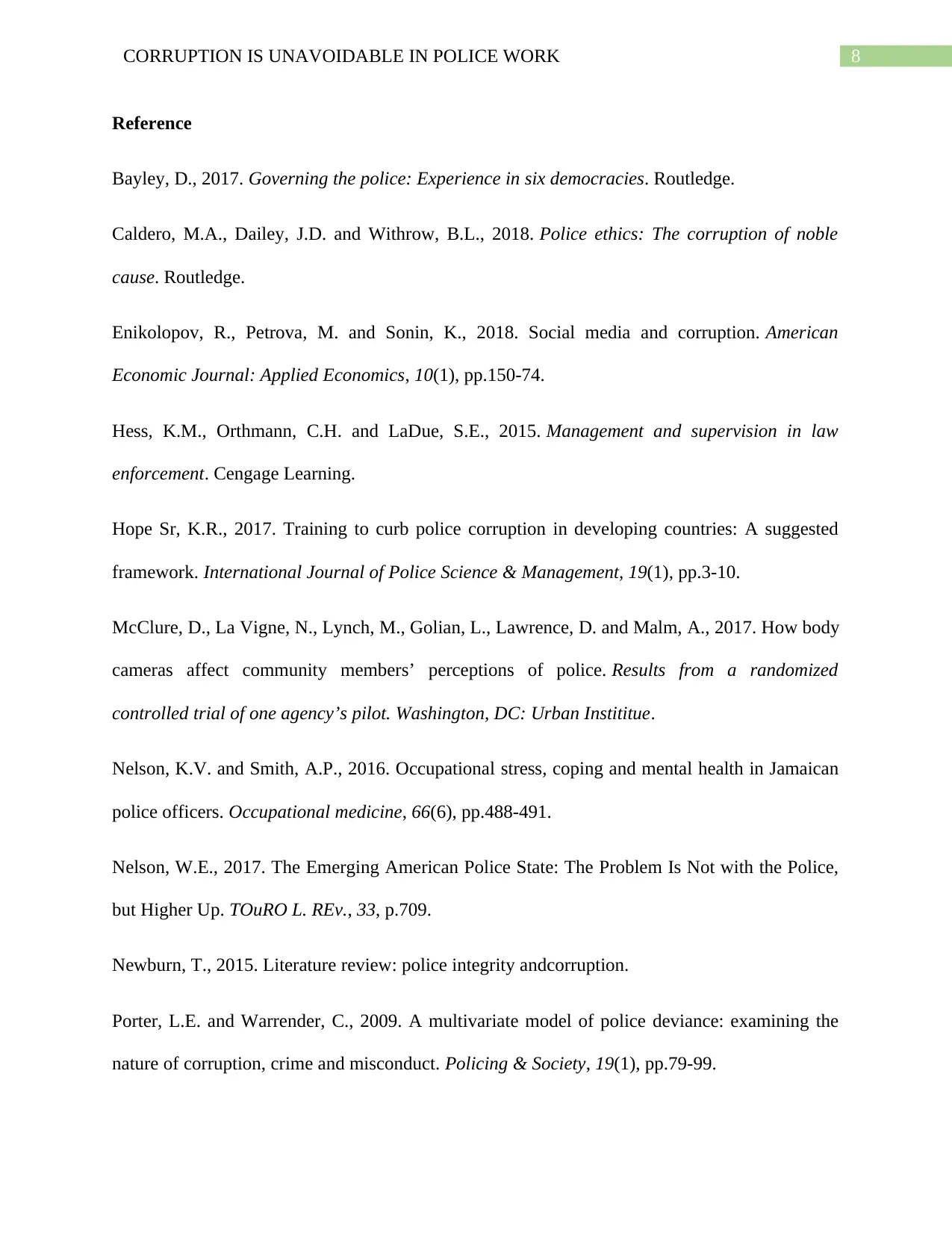
8CORRUPTION IS UNAVOIDABLE IN POLICE WORK
Reference
Bayley, D., 2017. Governing the police: Experience in six democracies. Routledge.
Caldero, M.A., Dailey, J.D. and Withrow, B.L., 2018. Police ethics: The corruption of noble
cause. Routledge.
Enikolopov, R., Petrova, M. and Sonin, K., 2018. Social media and corruption. American
Economic Journal: Applied Economics, 10(1), pp.150-74.
Hess, K.M., Orthmann, C.H. and LaDue, S.E., 2015. Management and supervision in law
enforcement. Cengage Learning.
Hope Sr, K.R., 2017. Training to curb police corruption in developing countries: A suggested
framework. International Journal of Police Science & Management, 19(1), pp.3-10.
McClure, D., La Vigne, N., Lynch, M., Golian, L., Lawrence, D. and Malm, A., 2017. How body
cameras affect community members’ perceptions of police. Results from a randomized
controlled trial of one agency’s pilot. Washington, DC: Urban Instititue.
Nelson, K.V. and Smith, A.P., 2016. Occupational stress, coping and mental health in Jamaican
police officers. Occupational medicine, 66(6), pp.488-491.
Nelson, W.E., 2017. The Emerging American Police State: The Problem Is Not with the Police,
but Higher Up. TOuRO L. REv., 33, p.709.
Newburn, T., 2015. Literature review: police integrity andcorruption.
Porter, L.E. and Warrender, C., 2009. A multivariate model of police deviance: examining the
nature of corruption, crime and misconduct. Policing & Society, 19(1), pp.79-99.
Reference
Bayley, D., 2017. Governing the police: Experience in six democracies. Routledge.
Caldero, M.A., Dailey, J.D. and Withrow, B.L., 2018. Police ethics: The corruption of noble
cause. Routledge.
Enikolopov, R., Petrova, M. and Sonin, K., 2018. Social media and corruption. American
Economic Journal: Applied Economics, 10(1), pp.150-74.
Hess, K.M., Orthmann, C.H. and LaDue, S.E., 2015. Management and supervision in law
enforcement. Cengage Learning.
Hope Sr, K.R., 2017. Training to curb police corruption in developing countries: A suggested
framework. International Journal of Police Science & Management, 19(1), pp.3-10.
McClure, D., La Vigne, N., Lynch, M., Golian, L., Lawrence, D. and Malm, A., 2017. How body
cameras affect community members’ perceptions of police. Results from a randomized
controlled trial of one agency’s pilot. Washington, DC: Urban Instititue.
Nelson, K.V. and Smith, A.P., 2016. Occupational stress, coping and mental health in Jamaican
police officers. Occupational medicine, 66(6), pp.488-491.
Nelson, W.E., 2017. The Emerging American Police State: The Problem Is Not with the Police,
but Higher Up. TOuRO L. REv., 33, p.709.
Newburn, T., 2015. Literature review: police integrity andcorruption.
Porter, L.E. and Warrender, C., 2009. A multivariate model of police deviance: examining the
nature of corruption, crime and misconduct. Policing & Society, 19(1), pp.79-99.
⊘ This is a preview!⊘
Do you want full access?
Subscribe today to unlock all pages.

Trusted by 1+ million students worldwide
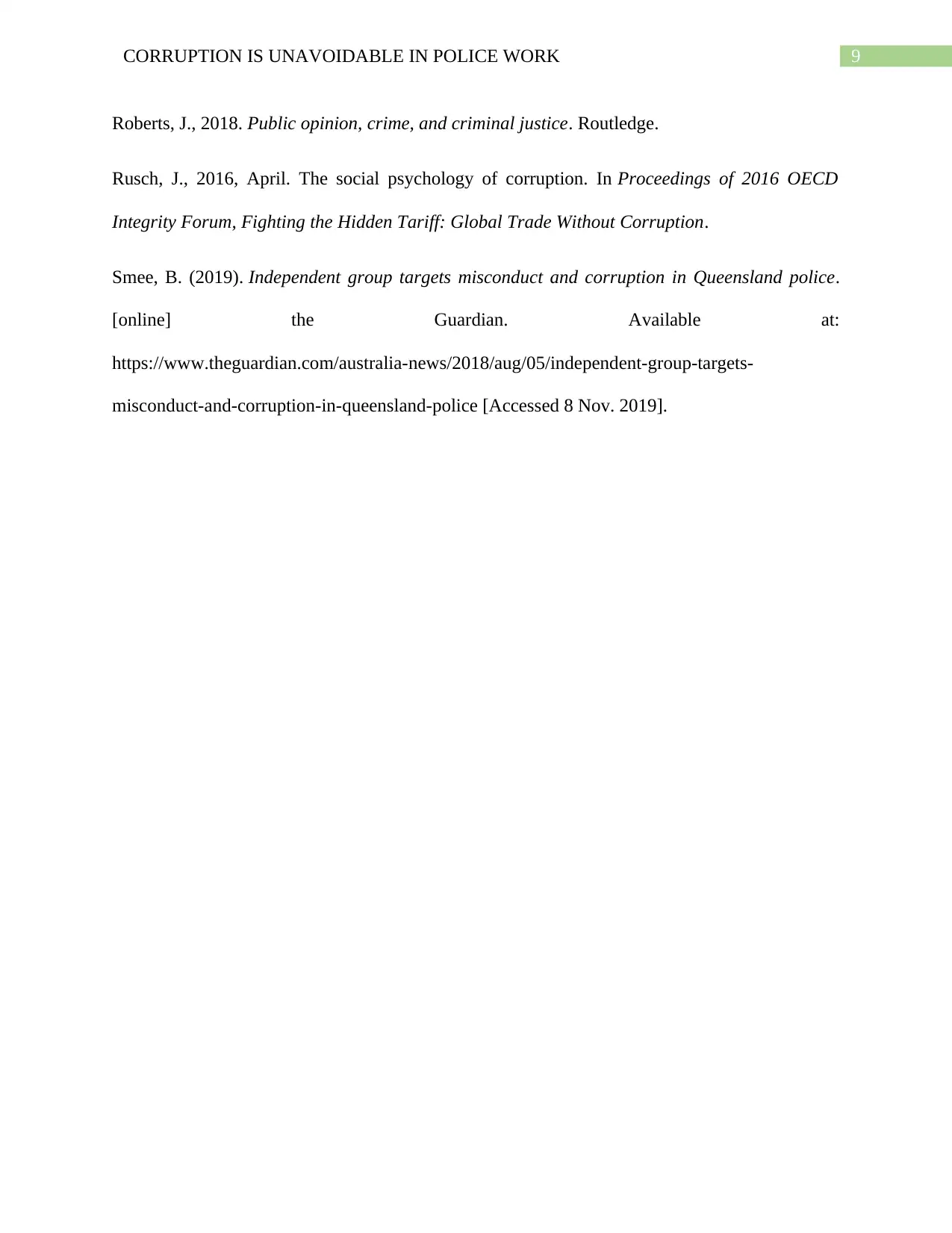
9CORRUPTION IS UNAVOIDABLE IN POLICE WORK
Roberts, J., 2018. Public opinion, crime, and criminal justice. Routledge.
Rusch, J., 2016, April. The social psychology of corruption. In Proceedings of 2016 OECD
Integrity Forum, Fighting the Hidden Tariff: Global Trade Without Corruption.
Smee, B. (2019). Independent group targets misconduct and corruption in Queensland police.
[online] the Guardian. Available at:
https://www.theguardian.com/australia-news/2018/aug/05/independent-group-targets-
misconduct-and-corruption-in-queensland-police [Accessed 8 Nov. 2019].
Roberts, J., 2018. Public opinion, crime, and criminal justice. Routledge.
Rusch, J., 2016, April. The social psychology of corruption. In Proceedings of 2016 OECD
Integrity Forum, Fighting the Hidden Tariff: Global Trade Without Corruption.
Smee, B. (2019). Independent group targets misconduct and corruption in Queensland police.
[online] the Guardian. Available at:
https://www.theguardian.com/australia-news/2018/aug/05/independent-group-targets-
misconduct-and-corruption-in-queensland-police [Accessed 8 Nov. 2019].
1 out of 10
Your All-in-One AI-Powered Toolkit for Academic Success.
+13062052269
info@desklib.com
Available 24*7 on WhatsApp / Email
![[object Object]](/_next/static/media/star-bottom.7253800d.svg)
Unlock your academic potential
Copyright © 2020–2026 A2Z Services. All Rights Reserved. Developed and managed by ZUCOL.

